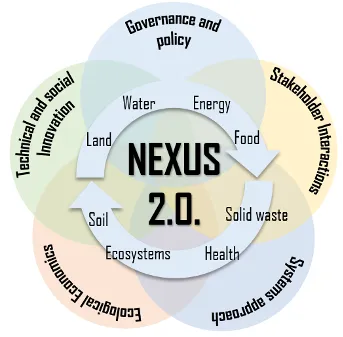TUM Nexus Lab

Nexus@TUM: TUM as frontrunner university with a targeted research and teaching agenda on Water-Energy-Food (WEF) Nexus
TUM makes a targeted contribution to solving pressing global socio-economic-technical issues such as climate change and environmental degradation through its Nexus@TUM research and teaching agenda focusing on expanding the Water-Energy-Food-Ecosystems (WEFE) Nexus topic. Referring to the WEF Nexus approach launched by SEI in 2011, Nexus@TUM highlights how integrated planning across water, energy and food and other sectors can enable more efficient resource use, thus reducing GHG emissions and mitigating climate change. Integrated planning can also augment climate change adaptation, particularly through water conservation. Thus, the Nexus approach can enhance water, energy and food security, whilst supporting ecosystem regeneration. Responsible governance is key to effective implementation. Thus, Nexus@TUM takes an integrated ESG approach to sustainability (Figure 1). Nexus@TUM further acknowledges that the issue at hand pertains equally to contexts in developing as in developed economies.
The Nexus@TUM research and teaching agenda comprises three parts: 1) TUM Nexus Lab, launched in 2021, 2) Nexus research group, and 3) Field of Study 11: Water-Energy-Food Nexus, a specialization in the TUM Environmental Engineering masters program.
The TUM Nexus Lab - Nexus@TUM is a virtual lab coordinated by the Chair of Urban Water Systems Engineering, which acts as an overarching entity clustering Nexus-related research and teaching activities at TUM. By showcasing ongoing projects and collaborations between various TUM schools on the Nexus topic, the lab reflects the momentum in place on the topic inside TUM, and illustrates project and knowledge partnerships beyond TUM. Inside TUM, the TUM Nexus Lab brings together the Chair of Urban Water Systems Engineering; Chair of Land Management / Centre of Land, Water and Environmental Risk Management; and Chair of Hydrology and River Basin Management at the School of Engineering and Design; Chair of Agricultural Production and Resource Economics and and Assistant Professorship of Urban Productive Ecosystems at the School of Life Sciences; Chair of Environmental and Climate Policy and Professorship of Policy Analysis at the School of Social Science and Technology; Chair of Circular Economy at Campus Straubing; School of Social Sciences and Technology; Chair of Renewable and Sustainable Energy Systems at the Department of Electrical and Computer Engineering; TUM SEED Centre and others. TUM Nexus Lab members co-author research articles and funding proposals, and co-supervise master students on the WEF Nexus topic, with the aim of building momentum on the Nexus topic at TUM and beyond.